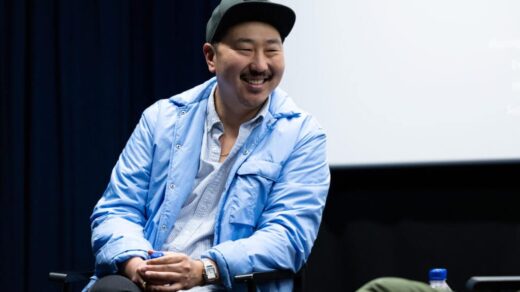‘The Obituary of Tunde Johnson’ Fights the Cycle of Police Brutality
It is not easy to watch The Obituary of Tunde Johnson.
The drama, which was a standout at the Toronto Film Festival and recently screened at the Outfest Los Angeles LGBTQ Film Festival, shows a Black gay teen, Tunde Johnson (Steven Silver), being killed by the LAPD.
Death is no escape for Tunde, however. Each time he dies, he wakes up and it is once again morning. By the end of each day, like a nightmarish Groundhog Day, he will once again be shot or choked to death by police officers.
It was not an easy film to create either. Director Ali LeRoi acknowledged that its difficult subject matter required “a deft touch” and “really trying to lean into what you care about, and not necessarily tiptoe around the things that you might be afraid you could get wrong.”
“To just put yourself in the space of someone that has to go through this torturous and seemingly endless agony … it was a tough movie to make,” said LeRoi. However, he sees the subject matter as vital when Black death plays in its own violent time loop in America.
“It doesn’t really shock us anymore when somebody puts up a video of another Black person getting shot or killed,” he lamented. However, LeRoi saw Tunde Johnson’s creation as a necessary act in a culture that has been historically desensitized to police brutality and where stories about it are overlooked and misreported.
“Do our stories matter? How are they told? Who’s telling them? What import is there? And how many times do we have to tell a version of this story before any sort of serious action is taken around it?” Le Roi asked. “I would like to see the end of these types of stories. It’s not a movie I want to have to make. But it ain’t new.”
Stanley Kalu was 19 when he penned the script. The African-born writer, who now resides in Los Angeles, had first been awakened to the horrors of police brutality as a senior in Kenya, when his biology teacher paused the class to discuss the shooting of Michael Brown in Ferguson, Mo. After moving to the United States, he has seen “the cycle of death” only continue to play out.
Tunde Johnson premiered in 2019. And this cycle, horrifically, still continues. Just this week, the police shooting of Jacob Blake, a 29-year-old Black man in Kenosha, Wis., sparked protests and yet more violence from Kyle Rittenhouse, a 17-year-old who shot three protestors, killing two.
However, to see this summer’s historic uprising of support for the Black Lives Matter movement from people of all backgrounds in response to the killings of George Floyd, Breonna Taylor, and other Black folks has inspired Kalu, who now sees his own film with a new lens.
“Within the Black community, we’ve been known that the police have been killing people in a cyclical way,” he said. “I think for me, it was awesome to experience everyone acknowledging that and being a part of that experience and being present for that experience.”
However, even as a majority of the United States acknowledges reality — nine out of 10 Americans say racism and police brutality are problems, in one poll — conservative media outlets like Fox News continue to demonize protestors and laud a doubling down of “law and order” in lieu of police reform.
This debate plays out on the television in Tunde Johnson, as well. In one scene, Tunde meets a conservative host and asks him whether he actually believes what he preaches But the answer to that question is self-evident in the real world, said Kalu.
“When considering conservative perspectives… you have to understand that a lot of these people are coming from a position where culturally, over time, they haven’t interacted with Black people. They haven’t interacted with the information. They have inherent racism that’s cyclical in itself,” he said.
“At the end of the day, white supremacy exists to oppress us, to suppress some minority groups. They’re very clear about that.”
Intention is also beside the point, said LeRoi. Those who know better and still promote racist narratives in media for either ratings or political power still have blood on their hands.
“Don’t casually toss around the notion that you’re OK with transgressions and abuses occurring against any segment of society if you’re not really OK with it,” he said. “You’re promoting that narrative and at the end of the day, you’re responsible. You are because you are in a position of power, you are in a position of influence. You have a lot of eyeballs on you. People have your trust.”
“If you want to pretend as if you have no responsibility for this, then you’re kind of like your president,” he added of President Trump, who has shirked all responsibility for the protests and violence his rhetoric inflames.
In addition to being a movie about police brutality, The Obituary of Tunde Johnson is also a coming-out film. In every time loop, Tunde declares himself as gay in a variety of ways to his parents, friends, and others around him. Navigating his secret relationship with his boyfriend, Soren (Spencer Neville), is what grounds the events of the day before each tragic killing occurs at night.
In crafting these coming-out narratives, Kalu was “over” the “cliché” of unsupportive Black parents. Indeed, Tunde’s mother and father invariably support him each time he confides in them about his sexuality and relationship.
“For me, it was actually trying to utilize coming-out imagery to show what could be, and what can be, and what does happen … to make sure that that Black queer kids, African queer kids don’t feel so alone and don’t feel so afraid,” he said.
For Kalu, it was important to have a protagonist that is not only Black but queer, since violence against these groups and those who live on the intersection is very much a reality.
“Globally, there seems to be a conscious and a real attack on identity … particularly of identity that one cannot control,” Kalu said. “I’ve seen it both in Africa with extreme violence against queer folk. And then I’ve seen it in America with extreme violence against Black bodies and queer folk. So to me, there was a natural tie.”
“It is incredibly important that when we discuss Black lives, we include queer LGBTQ+ narratives and people simply because we really are all in this boat together,” he added.
Tunde himself feels a tension between his Black and gay identities in the film; at one point, he expresses to his therapist that these identities “hate” one another, and that society simultaneously fears and ridicules him because of them.
When advocating for equality — and lives — it is essential for different marginalized communities to fight this mentality and the “divide and conquer” tactics used by supremacist groups to stymie progress, said Le Roi.
“A lot of times under those circumstances, you don’t have the space for empathy, because there’s an immediate threat. And that’s why this narrative, I think, has evolved the way that it has,” he said. “We’re not really against each other. It’s divide and conquer. And I hope for all intents and purposes, we don’t let that happen.”
Films like The Obituary of Tunde Johnson, which centers its narrative on a Black queer character, are also essential in moving the needle for change.
“Film and television are the greatest vehicles of empathy that I think exists,” Kalu said. “My technique, when it comes to writing at least, is to put you in the shoes of someone you do not know, really put you into their experience.
“When it comes down to representation and attacks on identity, which I think is fundamental to America, I just understand that if people don’t see these images [then they] do not understand … that these tragedies are not statistics. These are about people, human people with ancestors, with family, with brothers and sisters.”
In this regard, the goal of a storyteller, said Kalu, is to take “these abstract concepts and you make it human. To understand intersectionality is also to watch the film.”
LeRoi added, “For us to be able to push the notions of humanity, I think is the right and good thing to do.” And in doing so, a film can be part of the change that breaks the cycle of anti-Black violence in America.
“The idea of empowering people and humanizing people, these are big things,” said LeRoi. “But the reality is that your existence cannot be fruitful and positive if the baseline of how you move through the world is fear. You can’t be afraid.”
“We’ve got to find a way to address and conquer fear and recognize people who use fear as a way to undermine, as a way to control, as a way to destroy,” he added. “That’s a narrative of power and deceit. If I can keep people afraid, if I keep people ignorant, that they won’t pay attention to me being the person that is functionally stripping them of everything that’s worth living for and destroying lives. ‘If they’re afraid of each other, you ignore me.'”
After all, the time-loop of violence in Tunde Johnson may be a tool of fiction. But it also speaks to reality. Acknowledging this reality, said Kalu, is an essential step toward breaking free from it.
“I think it’s very vital that people start to view what is occurring as a cyclical problem, like a continuous thing, and therefore, the actions of everyday Americans [to fight it] must be daily and continuous in the same sense,” Kalu said.
The Obituary of Tunde Johnson is now screening in Outfest’s digital festival.
Original Article on The Advocate
Author: Daniel Reynolds





